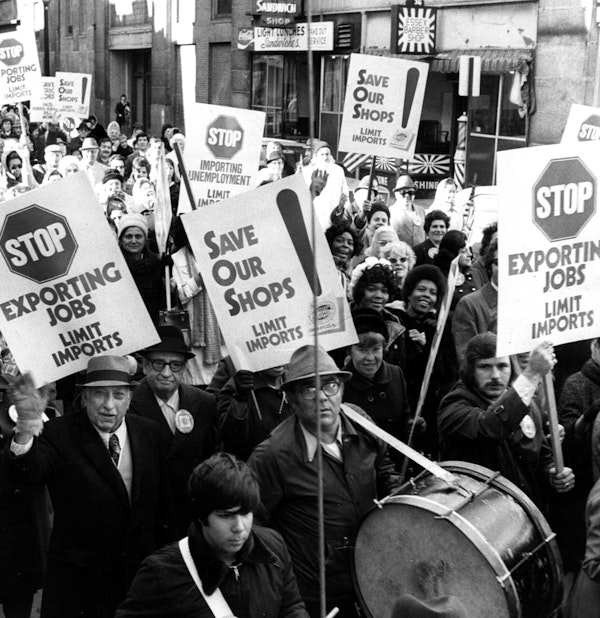What the populists get wrong
Ideas key to America’s economic success are now under attack from both the Left and Right. Here’s how conservatives must adapt to defend them.
 Garment workers stage a Buy American march in Boston, MA, on Nov. 16, 1972. (Sam Masotta / The Boston Globe via Getty Images)
Garment workers stage a Buy American march in Boston, MA, on Nov. 16, 1972. (Sam Masotta / The Boston Globe via Getty Images)
Economic conservatism – meaning a philosophical preference for free markets plus antipathy toward central planning and other heavy-handed government interventions in the economy – has a rich heritage in America, as well as a great track record of boosting the well-being of people around the world. The United States has long allowed individuals and businesses greater freedom than most other countries – a competitive edge that helps explain why it is much wealthier than its peers in Europe and Asia.
Yet rather than being celebrated today, the very policies that led to America’s economic success are facing concerted attacks from opponents across the political spectrum.
Populist critics on the Left and Right, making surprisingly similar economic arguments, are gaining influence among U.S. policymakers.
While the policies promoted by these populists are mostly either too vague to work or would produce too many undesirable side effects, the criticisms underlying them do point to an important truth: Traditional American economic conservatism needs an update. Its failure to articulate a compelling program for helping people left behind by the progress of democratic capitalism explains why populists have recently managed to gain so much steam in the United States. Traditional conservatism doesn’t offer clear answers on how to respond to trading partners like China that continually cheat on their commitments under trade treaties. And policies rooted in economic conservatism have allowed the unregulated rise of potentially harmful digital products like social media apps, as well as a dangerous hollowing out of America’s defense industrial base.
Unless we want to see the United States embrace more populist policies that could seriously threaten its success, conservatives need to develop fresh ideas for addressing these shortcomings.
The American style
American economic conservatives favor giving individuals as much freedom as possible to make their own choices (provided they don’t harm others). They base this preference on two ideas. First, conservatives view economic freedom as an inseparable aspect of individual freedom in general and as a vital end in itself. Second, history shows that societies with high levels of economic freedom achieve better economic results and higher levels of well-being than do less free societies.
Economic conservatism represents a strand of thinking within the broader tradition of classical liberalism, which prizes individual autonomy and distrusts centralized power in all domains. The broad tent of classical liberalism encompasses both economic conservatives and Center-Left liberals who favor more generous safety net policies and stricter business regulation than conservatives typically do.
American economic conservatism has always differed from conservatism in Europe and elsewhere. European conservatism has typically had “traditionalistic, anti-intellectual, and often mystical propensities,” in the words of the Austrian economist Friedrich Hayek, whose work strongly influenced U.S. conservative thought after World War II. Historically, European conservatives supported the use of state power to defend aristocratic privilege, often asserting claims based on religious authority. In the United States, where the nation’s founding revolution swept away inherited status – other than the racial hierarchies of the old South – economic conservatives have nearly always rejected such reactionary concepts and welcomed the dynamism and disruption associated with free markets.
U.S.-style economic conservatism rose to prominence following World War I as a reaction to the growing popularity of Marxist-inspired central planning. A clear through line connects the careers of conservative leaders like President Calvin Coolidge, Senator Robert Taft, and President Ronald Reagan. Each extolled private sector-led economic growth and opposed central planning because they believed it would frustrate progress – not because it threatened traditional privileges.
During the middle third of the 20th century, collectivist ideas came to dominate much of academic economics, despite the efforts of Milton Friedman – a Nobel Prize-winning economist at the University of Chicago – and a few other lonely conservatives. Economic conservatism became more popular after the 1970s, thanks to the failures of state-centered policies in the early postwar decades and the thought leadership of conservatives like Robert Lucas (another Nobel laureate economist at Chicago), the historian and philosopher Thomas Sowell, the political scientist James Q. Wilson, the columnist George Will, and many others.
The conservative case against central planning
American economic conservatives oppose central planning for several historically well-founded reasons.
First, even if you think central planning makes sense in theory, experience has shown that in practice, central planners lack the kind of information they’d need to make sound decisions in a complex modern economy. Decentralized free markets do a much better – if still imperfect – job coordinating the activities of people and companies through evolving prices.
Second, diverse societies lack a single agreed-upon set of values to guide central planners. As a result, planners have to pick one group’s preferences to prioritize over those of other groups. By contrast, pluralistic free markets allow people with differing values to interact for mutual gain without having to agree on overarching objectives.
Third, central planning undermines individual freedom, including in noneconomic domains. It can run into conflict with the rule of law, for example, since the latter sometimes generates outcomes divergent from planners’ goals. Planning what an economy produces also means planning what people can then consume – another way central planning limits individual choices.
Fourth, central planning tends to empower certain personality types – people with a drive to rule others, not a desire to profit by producing useful products. That tendency can give rise to oppressive government.
Finally, central planning usually undermines even its own stated goals. Although it may aim to reduce the inequalities that emerge in competitive market economies, it often generates its own forms of inequality by picking winners and losers. And since it does so by design, it creates strong incentives for corporations, unions, and other groups to focus on lobbying and capturing government decision-making rather than on innovating, maximizing efficiency, and competing for customers.
Economic conservatives in the United States generally agree with Left-leaning thinkers that federal, state, and local governments can and should play important roles in the economy. These roles include maintaining a social safety net and providing public goods – such as roads, schools, and public order – that would otherwise be undersupplied by the market. While conservative thinkers since Friedman have generally favored low barriers to international trade, conservative politicians in the United States have rarely been doctrinaire free traders. They have, rather, pursued a variety of pragmatic tariff and “buy American” policies in order to protect domestic industries and national security.
 Milton Friedman. (Reason Foundation)
Milton Friedman. (Reason Foundation)
The illiberal convergence
In the last decade, progressive American thinkers like Joseph Stiglitz, the Nobel Prize-winning Columbia University economist, and a range of younger academics have become increasingly vocal in condemning contemporary capitalism. Meanwhile, advocates for modern monetary theory, such as the economist Stephanie Kelton, have argued that governments like ours that print their own currency could afford to spend far more on progressive causes by simply expanding the money supply. They insist that the U.S. government could follow this path without causing inflation or other unwanted side effects and that the only thing preventing Washington doing so is conservatives’ misguided fixation on austerity.
On the Right, meanwhile, a growing group of market-skeptical critics – who variously refer to themselves as “populists,” “nationalists,” and “common good conservatives” – have repudiated traditional economic conservativism and begun arguing for the use of muscular federal intervention to accomplish what they view as conservative ends. This group includes the political scientist Patrick Deneen, the legal scholar Adrian Vermuele, the journalist Sohrab Ahmari, the writer Oren Cass of the think tank American Compass, and the media entrepreneur Steve Bannon, one of President Donald Trump’s longtime advisors.
Members of this group argue that the United States’ free market policies, especially on trade, have undermined the material well-being of working-class Americans and contributed to some of the pathologies plaguing communities across the country. To address these ills, they call, above all, for higher import barriers, severe immigration restrictions, and industrial policies (meaning various forms of federal government support) to strengthen the domestic manufacturing sector.
One of the most surprising things about these two camps is the many ways in which their ideas overlap. Left- and Right-wing populists criticize free markets on the same grounds, arguing that:
- The dynamic forces released by market capitalism undermine traditional economic relationships. In different ways, both Patrick Deneen on the Right and the Democratic Socialists of America on the Left make this argument. And they are correct in their conclusion – but this outcome is desirable in the eyes of economic conservatives.
- Free markets generate unacceptable degrees of inequality. Senator Bernie Sanders and Oren Cass agree on this point.
- Free individuals sometimes value the wrong things, which can undermine collective goals or morality. Many progressive critics of capitalism lament the effects of “consumerism” on environmental sustainability, while Deneen and other like-minded conservatives contend that today’s lightly regulated markets lead to consumption choices inconsistent with what they define as the common good.
- Classical liberal economic policy, whether Center-Left or Center-Right, is not moving societies fast enough to the utopian future many critics desire.
Left and Right-wing populists also resemble one another in their core policy programs: Both essentially call for central planning. Some Right-wing populists like Bannon also advocate for significantly higher taxes on high earners and businesses and greater income redistribution – arguments that closely match many progressives’ priorities.
Another feature linking today’s Left- and Right-wing populists is that they both tend to accuse classical liberals of being stuck in the past. In the process, however, populist critics often mischaracterize their opponents’ positions, falsely accusing them of “neoliberal dogmatism,” of shilling for capital at the expense of labor, and of putting the well-being of foreigners over that of American workers.
Bad alternatives
Even as populists in both camps attack classical liberal ideas, however, they rarely acknowledge the past failures of central planning, and they tend to sidestep evidence showing that, since World War II, lower trade barriers have dramatically improved the lives of most Americans.
Both populist camps also tend to be vague about the specific policies they’d like to institute. As John Cochrane, a classical liberal economist at the Hoover Institution, has noted, few if any proponents of modern monetary theory have clearly articulated the details of their economic agenda or have made specific predictions that later events might refute. It’s true that, having failed to anticipate the inflationary consequences of the Biden Administration’s $5 trillion in spending on progressive priorities, advocates of modern monetary theory are now in retreat. Despite that failure and the Democrats’ 2024 electoral defeat, however, many progressives are currently doubling down on their antimarket views. You can find evidence for this trend in the negative reactions many progressives have had to the market-friendly book Abundance by the center-Left journalists Ezra Klein and Derek Thompson. You can also hear it in calls by leading progressives like Senator Sanders for the Democratic Party to respond to its 2024 defeat by shifting further toward progressive economic populism.
As for the illiberal Right, many of its leading thinkers are also vague about their policy preferences. Nationalist-populist scholars like Deneen and Vermuele argue for dramatically empowering the federal executive to pursue conservative ends unchecked by judicial review – but they mostly remain hazy about which specific goals they want the superpowered executive to work toward. Deneen and Vermuele favor transformational changes in economic policies primarily in order to advance noneconomic objectives, like reviving traditional family structures and local communities. But they don’t make clear how their program would advance those objectives, or whether doing so would have negative side effects, like weakening the American economy.
The thinkers at Cass’s American Compass aim to improve the material well-being of working-class people, and they champion several good but uncontroversial ideas that command support across the political spectrum. These include promoting enrollment in trade schools in order to improve Americans’ workplace skills, improving workers’ financial well-being through tax policies like the earned income tax credit (EITC) rather than through expanded social-welfare spending, and reducing U.S. vulnerability to Chinese dominance of the manufacturing of semiconductors and other components vital to national defense.
Yet these pundits – as well as thinkers at like-minded organizations such as the online magazine Compact, founded by Ahmari – are also noncommittal on key questions. Do they prefer a future with much higher tariffs inevitably leading to less international trade in both directions, for example? Or do they hope that Washington’s use of tariffs will induce other governments to lower their barriers to U.S. exports – even though this would mean a world with more trade, which could mean more damage to American workers in industries competing with foreign imports? Does their insistence on rebuilding U.S. manufacturing mean they’d be willing to use tools that extend beyond trade barriers, such as policies aimed at slowing the adoption of labor-saving technologies?
The truth is that policies like those advocated by American Compass and other outlets on the populist Right would significantly raise the costs of labor and of imported raw materials and components – which would increase the costs of producing goods in the United States. Higher costs would hurt both U.S. exporters and goods producers focused on the domestic market, which over time would likely reduce overall employment in U.S. manufacturing. And a rise in prices for imported goods and for domestic goods competing with them would almost surely reduce inflation-adjusted wages for workers in export-oriented industries and the service sector – that is, for the vast majority of working Americans. Yet almost nowhere do today’s common-good populists grapple with such trade-offs.
Some Right-wing populists also argue for greater unionization and for crackdowns on the financial sector, insisting that such changes would increase investment in U.S. manufacturing. In truth, however, such shifts would likely reduce capital flows and innovation, thus weakening U.S. manufacturing. Meanwhile, tighter immigration restrictions – which are favored by Ahmari, Bannon, and Cass – would soften housing demand somewhat. But they would almost surely raise home prices by creating labor shortages in the homebuilding industry.
To summarize: Most if not all the policies favored by illiberal critics of classical liberalism would indeed redistribute America’s economic pie toward workers in certain favored industries, namely manufacturing industries currently facing significant competition from imports. But this process would also shrink the size of that pie – thereby reducing living standards for most working Americans. Postliberal economic programs are an agenda for scarcity, not abundance.
 Instagram app on an iPhone. (PixieMe / Shutterstock)
Instagram app on an iPhone. (PixieMe / Shutterstock)
Rebooting economic conservatism
Despite the many weaknesses of current arguments against classical liberalism, they’ve gained traction because they point to genuine holes in classical liberal thought.
The hardest question for economic conservatives today is how to expand opportunity and well-being for people left behind by the disruptions accompanying economic growth. Such people face problems including job losses due to technological change and trade, income inequality, and low real wage growth for many working-class people in recent decades. Traditional economic conservatives have long argued that, since America gains from trade and technological progress overall, those who benefit could compensate those who lose out and still come out ahead. But when policymakers have tried to translate this theoretical idea into practical policies, like the Trade Adjustment Assistance program, their programs have proved woefully inadequate at retraining people like laid off autoworkers or coal miners in the Rust Belt.
Economic conservatives need to do better. In addition to uncontroversial ideas like promoting trade schools and wage subsidies like the EITC – changes American Compass and many others advise – economic conservatives should support a range of policies that would better prepare Americans to compete in tomorrow’s economy. These should include improving reading and math instruction in early grades and increasing accountability for failing schools; supporting competition and innovation in higher education in order to reduce the costs of useful postsecondary degrees and credentials; expanding job opportunities and lowering housing prices by making it easier to build things in America; and liberalizing overly restrictive occupational licensing rules, such as those regulating hair braiders, massage therapists, and real estate agents. Political realities may also require accepting some policies conservatives find distasteful, like raising the minimum wage that private-sector employers must pay.
Economic conservatives should also acknowledge that they haven’t fully thought through how America should address predatory trade behavior by China. An oversimplistic version of classical liberal thinking might suggest that if China wants to make quality goods available to American consumers at rock-bottom prices through currency manipulation and export subsidies, Americans should happily buy them, regardless of how China treats U.S. exporters trying to access the Chinese market. In practice, however, import-competing industries in the United States would rightly view this policy as a betrayal of the implicit bargain the U.S. government offers American manufacturers and their workers: Accept the challenge of foreign competition in exchange for a federal promise to ensure a level playing field. This is why conservative policymakers have invariably fought hard against predatory behavior by China and, in the late 20th century, by Japan and other countries as well.
Too often, however, U.S. leaders – both economic conservatives and center-Left policymakers – have treated such behaviors as isolated abuses that Washington can effectively address through temporary one-off countermeasures. It may be that, for the foreseeable future, classical liberals should instead embrace a partial decoupling with China and a larger U.S. government role in managing export and import flows between China and the United States – a solution that’s far from ideal but perhaps better than any alternative, in view of China’s persistent bad-faith trade behavior.
Economic conservatives should also recognize the necessity of rebuilding America’s defense industrial base. The United States has always pursued “Buy American” policies for major weapons systems, but the country badly needs new defense procurement rules that would force manufacturers to make mission-critical military components, such as advanced semiconductors, on U.S. soil.
Another area ripe for an update is regulation of harmful and addictive consumer products in the digital domain. Economic conservatives have long supported restrictions on addictive goods like alcohol and tobacco products, but they’re only starting to belatedly realize that similarly laissez faire policies toward social media have also had terrible results, particularly for teens and preteens. With far more potent AI-powered services appearing on the horizon, classical liberals need to consider sensible digital restrictions that will protect Americans without overly inhibiting innovation. But they must not throw the baby out with the bathwater – as many technophobic populists would likely do.
Even as they make these changes, however, economic conservatives should stand firm for free markets and against central planning. Again and again, history has proven that democratic capitalism is the most powerful engine for expanding opportunity and raising well-being that the world has ever known. We should therefore update it – but not undermine it.
The Catalyst believes that ideas matter. We aim to stimulate debate on the most important issues of the day, featuring a range of arguments that are constructive, high-minded, and share our core values of freedom, opportunity, accountability, and compassion. To that end, we seek out ideas that may challenge us, and the authors’ views presented here are their own; The Catalyst does not endorse any particular policy, politician, or party.

